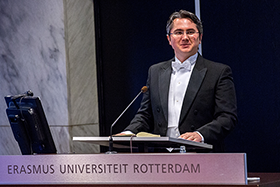PhD Defence: The Strategy Process, A Middle Management Perspective
 Strategies are mostly formulated by the top managers of organizations, yet it is middle managers who put strategies into practice. In his PhD dissertation entitled ‘<link doctoral-programme phd-in-management phd-projects detail>The Strategy Process: A Middle Management Perspective’, Nufer Ates researches the crucial alignment between senior and middle management.
Strategies are mostly formulated by the top managers of organizations, yet it is middle managers who put strategies into practice. In his PhD dissertation entitled ‘<link doctoral-programme phd-in-management phd-projects detail>The Strategy Process: A Middle Management Perspective’, Nufer Ates researches the crucial alignment between senior and middle management.
Well-formulated strategies only produce superior performance for the firm, when they are successfully implemented. Unless middle managers understand and are committed to the strategic goals of the top management, they are unlikely to support strategy implementation. A manager that does not share the strategic goals of the organization may exert negative influence on his\her subordinates and consequently divert their efforts away from organizations’ strategic direction.
Nufer’s research sheds light on the dark side of the misaligned middle managers in strategy implementation. Data from 900 employees in 110 organizational units of a large Dutch service organization operating in the energy sector proved that managers who are not aligned with the strategic views of top management hinder strategy execution. Misaligned managers build consensus on and commitment to strategies that are different than organization’s strategies. Their subordinates are puzzled by the contradicting messages communicated by their immediate supervisor and the top management of the organization. On the other hand, strategically aligned managers act as facilitators of the strategy and truly support strategy implementation
 The research concludes by suggesting organizations focus on getting their middle managers on board for successful strategy implementation, so that they can bridge organizational strategies and their subordinates’ efforts to implement organizational strategies.
The research concludes by suggesting organizations focus on getting their middle managers on board for successful strategy implementation, so that they can bridge organizational strategies and their subordinates’ efforts to implement organizational strategies.
Ates defended his dissertation at Erasmus University Rotterdam on Friday 17 January, 2014. His supervisors were <link people patrick-groenen>professor Patrick Groenen and <link people daan-van-knippenberg>professor Daan van Knippenberg. Other members of the Doctoral Committee were professor Tomi Laamanen (University of St. Gallen), <link people justin-jansen>professor Justin Jansen and <link people taco-reus>professor Taco Reus (both of Erasmus University Rotterdam).
About Nüfer Ates
Nüfer Yasin Ateş obtained his Bachelor’s degree with Honours from Istanbul Technical University, Istanbul/Turkey in Industrial Engineering. He received his Masters’ degrees in Industrial Engineering from Bogazici University and in Engineering Management from Istanbul Technical University. Prior to his PhD at Erasmus School of Economics, he worked as a research assistant at Istanbul Technical University.
Following his PhD, he has recently joined Organization and Strategy department of School of Economics and Management, Tilburg University as a tenure track Assistant Professor. His main research interests include strategy process, strategic cognition and behavioural strategy with a special focus on middle managers. He presented his research in several international conferences. His research is published and currently under review in top management journals. He is a member of the Strategic Management Society and the Academy of Management.
 Abstract of The Strategy Process: A Middle Management Perspective
Abstract of The Strategy Process: A Middle Management Perspective
Organizations must get middle managers on board in order to successfully put strategy into action. Middle managers are key strategic players in organizations due their close connection to daily operations and their reach to higher echelons. Unless these managers develop a shared understanding of and are committed to the organizational strategic goals, organizations are unlikely to realize their strategies. This dissertation focuses on the psychological foundations of middle managers’ contribution to the strategy process by investigating their strategic cognitions, leadership and fairness perceptions.
In this dissertation, we develop a new method that provides a more comprehensive analysis of strategic consensus within and between organizational units (chapter 2), challenge the popular perception of managers’ transformational leadership as a solely positive phenomenon in strategy implementation (chapter 3), and examine the drivers of middle managers’ strategic alignment and commitment (chapter 4). Our results equip researchers with the necessary tools for integrative theory building in managerial and organizational cognition, reveal the dark-side of transformational leadership that is contingent upon the strategic alignment of the manager, and highlight the importance of middle managers’ fairness perceptions about strategy making. We also look into the repeated testing problem and recommend strategies and tools to cope with this problem (chapters 5 and 6). Consequently, this dissertation extends the reach of organizational psychology and organizational behaviour in strategy research by contributing to the strategy process, managerial cognition and behavioural strategy research streams.
Photos: Chris Gorzeman / Capital Images


